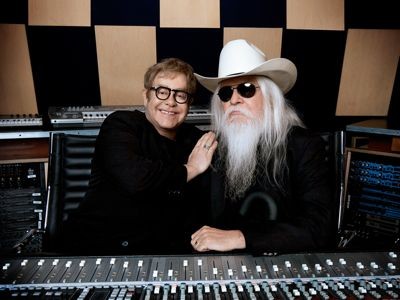| Reviews & Columns |
|
Reviews DVD TV on DVD Blu-ray 4K UHD International DVDs In Theaters Reviews by Studio Video Games Features Collector Series DVDs Easter Egg Database Interviews DVD Talk Radio Feature Articles Columns Anime Talk DVD Savant Horror DVDs The M.O.D. Squad Art House HD Talk Silent DVD
|
DVD Talk Forum |
|
|
| Resources |
|
DVD Price Search Customer Service #'s RCE Info Links |
|
Columns
|
|
|
Union, The

Reviewed at the 2011 Tribeca Film Festival
By 2009, Elton John had reached a point where he was, in his words, "too young to retire, and too old to make music that was crap." So he decided to look back, to make the kind of songs that he started out wanting to make. To do that, he decided to collaborate on an album with Leon Russell, his idol, whom he'd toured with in the early 1970s and hadn't seen since. John became a multi-platform superstar, a cultural icon, an industry. Russell--who was always more of a musician's musician than a pop star--was all but forgotten, doing small gigs in secondary markets. John reached out to him. They made the album. The great T-Bone Burnett produced it.
And Cameron Crowe filmed it. Crowe, who started out as a music journalist (his experiences at Rolling Stone inspired Almost Famous, his best film to date), has always had a barely-concealed fascination with bootlegs and studio chatter; he's perfectly suited to direct The Union, a lightweight but ultimately moving documentary account of John and Russell's collaboration.
The film is also, almost in passing, a biography of the two men, and Crowe's archaeological bent is well-employed--he trots out old tapes, rare TV performances, the works. But he's primarily focused on the present, even if the past is always lurking in the subtext. What's up front is production, the act of putting the album together, and to his credit, Crowe gets what feels like one of the more thorough accounts we've seen of the process of making an album. John, clad almost every day in identical black Adidas tracksuits, is a bundle of energy and enthusiasm, working the songs, trying new things, pulling the rock up the hill. Russell is more of a laid-back, Yoda-like creature, Mr. Zen in his loud shirts, stroking his wispy white beard and exhibiting his dry wit and wry comic timing (When he first saw John, he says, he "thought my career was over. Pretty much was, actually...").
The Union is not an aged Metallica: Some Kind of Monster, all full of ego trips and conflict. But the creation of the record is not an entirely smooth ride; it takes the two men some time to find their working rhythm, and John is frequently his own worst enemy (a stark scene finds him recording his leading vocals, and struggling badly). Early on, Russell has a near-fatal health scare, resulting in a five-hour brain operation; he returns to the studio understandably shaken, and easily exhausted. But it's also given him a shot of urgency; he sits down to play a new song, and jokes about it, to lower expectations ("I had just taken my Ambien when I wrote this... now here in the light of day, I'm trying to remember what it was"). But what comes out is raw, full, powerful, and--in the film's most extraordinary scene--John is absolutely overcome with emotion while listening to it. That's when he knows they're on to something.
In his interviews, John is refreshingly candid and impeccably self-aware--he knows who he is, where he's at, and what his place is. "If it doesn't sell, it doesn't sell," he says. "I don't care. It's the music I want to make." (That said, he sure does spend a lot of screen time fretting about the opening week sales.) When they do a photo shoot together after the album is complete, he talks to Russell about what a happy experience it was for him, and it doesn't feel like put-on show biz bullshit staged for the camera--it's so warm and heartfelt, you just believe it. And you agree.
Crowe keeps his cameras present, hanging out in the studios, watching the men work, chatting with Burnett (who defines his role as just being a good listener, since as producer, "you're a proxy for the audience"). The filmmaker, who hit a bad bump a few years back with the unfortunate Elizabethtown (a film that, I maintain, would have been about twice as good and nowhere near as panned with just about any other actor in its leading role), is perhaps going back to his roots in the same way John was. He's clearly having a ball making the movie--trying out different looks with contrasting video formats and film stocks, and using the split screen so frequently and so skillfully that it almost becomes an illustration of the film's thematic movements. The various partnerships--John and Russell, John and lyricist Bernie Taupin, the performers and Burnett--are separate, but they're working in harmony, feeding off of each other to become a single unit. Late in the film, John sings "Border Song," by himself on the piano, and Crowe puts the singer's younger self in the other half of the split screen, eloquently saying more in that visual about the passing of time and the power of pop music than any sociological essay could. At the end of The Union, on the day of the album's release, the two men play together at the Beacon Theater in New York, and in their final voice-overs, each shares his thoughts and appreciation of what the other man did for him--then and now. The words have weight. The sentiments have power. It's a charming conclusion to a truly lovely picture.
Jason lives in New York. He holds an MA in Cultural Reporting and Criticism from NYU.
|
| Popular Reviews |
| Sponsored Links |
|
|
| Sponsored Links |
|
|
| Release List | Reviews | Shop | Newsletter | Forum | DVD Giveaways | Blu-Ray | Advertise |
|
Copyright 2024 DVDTalk.com All Rights Reserved. Legal Info, Privacy Policy, Terms of Use,
Manage Preferences,
Your Privacy Choices | |||||||











